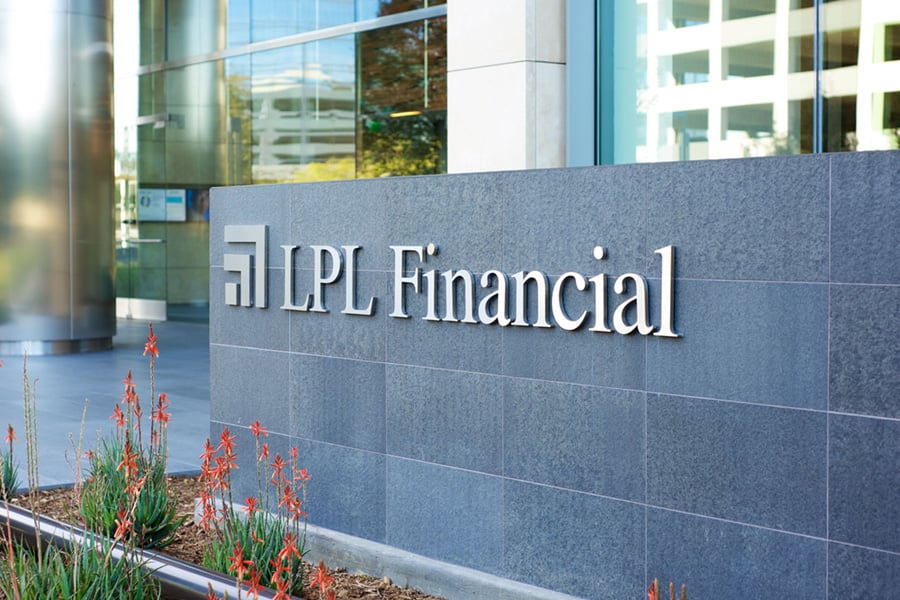

LPL Financial's announcement late Wednesday that it was buying the wealth management business of Waddell & Reed Financial Inc. as part of a larger, complicated transaction received the nod of approval from some securities analysts who cover the broker-dealer, which has a long history of deal making and acquisitions.
They really like the price, $300 million, LPL was paying for 900-plus advisers.
"Booyah ... LPL Announces Home Run Transaction," was the headline to a note written by Steven Chubak, senior analyst for diversified brokers and banks at Wolfe Research last night.
"Adding Advisory Assets from [Waddell & Reed] at an Attractive Price," was the title of the note by Jefferies' equity analyst Gerald O'Hara, also from Wednesday.
The wealth management arm of the struggling Waddell & Reed Financial encompasses 921 registered reps and financial advisers and $63 billion in client assets. The deal is expected to close by the middle of next year and will cost LPL about $300 million.
In a presentation to investors, LPL stated the price represented a transaction multiple of 6.5 times or lower of earnings before interest, taxes, depreciation and amortization, or EBITDA. That is on the low end of LPL's target price range for such deals, which is between 6 times to 8 times EBITDA, according to the company.
And that's what analysts focused on, price, when cheering the deal, which LPL estimated could add $50 million of EBITDA a year after it closes.
"Our take: this is very positive as we would argue there is considerable conservatism baked into the company’s run-rate EBITDA accretion guidance," Chubak wrote. And the deal could actually get cheaper for LPL if the retention of the Waddell & Reed's assets exceed 70%, an agreed upon rate, noted O'Hara.
LPL was the number one "destination for departing Waddell advisers pre-transaction so while there remains competition for the independent advisor, LPL's brand and capabilities position it very well in our view," O'Hara wrote.
One analyst expressed some caution with the deal. "In terms of potential negatives, there is some question regarding the strength of the legacy Waddell & Reed wealth management business and advisers given historical net outflows," wrote Kyle Voigt of Keefe Bruyette & Woods. "However, we believe onboarding these advisers/assets onto [LPL] should improve production retention rates."
LPL's purchase of Waddell & Reed's wealth management group is an unusual, two-step transaction. LPL will purchase the business, but only after Macquarie Asset Management closes its deal for the outstanding shares of Waddell & Reed, which was also announced Wednesday after the market closed.
Macquarie Group is acquiring all of the outstanding shares of Waddell & Reed for $25 per share in cash representing total consideration of $1.7 billion. LPL and Macquarie are also entering a long-term sponsorship agreement as part of the transaction.
In October, Waddell & Reed’s stock price jumped to a recent high on speculation that it was a takeover target. Waddell & Reed also owns the Ivy Funds, a leading manager of actively managed mutual funds, a struggling part of the asset management industry.
LPL Financial is the largest independent broker-dealer with 17,000 reps and advisers.

Catch-up contributions, required minimum distributions, and 529 plans are just some of the areas the Biden-ratified legislation touches.

Following a similar move by Robinhood, the online investing platform said it will also offer 24/5 trading initially with a menu of 100 US-listed stocks and ETFs.

The private equity giant will support the advisor tech marketing firm in boosting its AI capabilities and scaling its enterprise relationships.

The privately backed RIA's newest partner firm brings $850 million in assets while giving it a new foothold in the Salt Lake City region.

The latest preliminary data show $117 billion in second-quarter sales, but hints of a slowdown are emerging.
Orion's Tom Wilson on delivering coordinated, high-touch service in a world where returns alone no longer set you apart.
Barely a decade old, registered index-linked annuities have quickly surged in popularity, thanks to their unique blend of protection and growth potential—an appealing option for investors looking to chart a steadier course through today's choppy market waters, says Myles Lambert, Brighthouse Financial.
